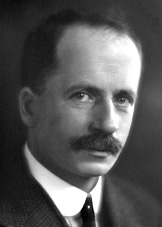Macleod, John James Richard (1876–1935)

John Macleod was a Scottish physiologist who shared with Frederick Banting the 1923 Nobel Prize in Physiology or Medicine for his role in the isolation of insulin and studies of its use in treating diabetes. The actual discovery of insulin was made by Banting and Charles Best working in Macleod's laboratory at the University of Toronto. Macleod's published works include Diabetes (1913) and Carbohydrate Metabolism and Insulin (1926).
Macleod was born on 6 September 1876, in Clunie, Perthshire. He attended the University of Aberdeen, where he earned a degree in medicine in 1898. After completing his medical studies, he worked as a physician in various hospitals in Scotland and England.
Macleod's most significant contribution to medicine was his work on the role of insulin in the regulation of blood sugar levels. In the early 1920s, he collaborated with Frederick Banting, a Canadian physician, to develop a treatment for diabetes. Banting had discovered that the hormone insulin could be used to treat diabetes, but he needed the help of a physiologist to refine the treatment. Macleod provided the expertise and facilities necessary to test and develop the treatment.
Together, Macleod and Banting conducted experiments on dogs to determine the effectiveness of insulin in regulating blood sugar levels. They found that insulin injections could lower blood sugar levels in dogs and that the effects were temporary. They also discovered that the effectiveness of the treatment depended on the timing and dosage of the insulin injections. With these findings, Macleod and Banting were able to refine the treatment and demonstrate its effectiveness in humans.
The Nobel Prize shared by Macleod and Banting recognized their discovery of insulin and its use in the treatment of diabetes. Macleod's contributions to medicine did not stop there. He continued to conduct research on the physiology of the pancreas and the regulation of blood sugar levels, which helped to further refine the treatment of diabetes.
In addition to his work in medicine, Macleod was also a respected educator. He held teaching positions at the University of Aberdeen, the University of Toronto, and the University of Western Ontario. He was known for his dedication to his students and his ability to explain complex scientific concepts in a clear and concise manner. John Macleod died on 16 March 1935, at the age of 58. His contributions to the field of medicine continue to have a profound impact on the lives of people with diabetes. The discovery of insulin and its use in the treatment of diabetes has saved countless lives and improved the quality of life for millions of people around the world.


